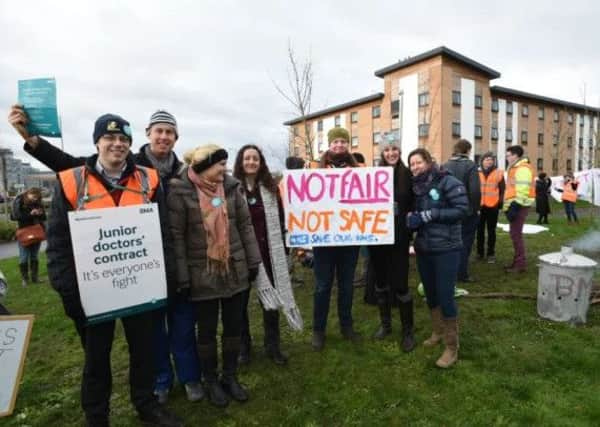BMA STRIKE: How much are junior doctors paid '“ and how does it compare?


As well as planned action later this month, doctors will also walkout for five days in October, November and December.
“Not about pay”
Junior Doctors have insisted the row isn’t about pay but patient safety, however, it has led to intense scrutiny of their pay packets.
Advertisement
Hide AdAdvertisement
Hide AdThe row is centered around new contracts which would see doctors’ basic pay go up, but with some evening and weekend shifts classed as normal working hours, their overall take-home pay will go down.
Doctors claim these changes would be unsafe, but the Government says they’re essential for a seven day NHS.
How much are junior doctors paid?
Under their old contract, doctors could receive up to £37,000 a year: The minimum: Most start on a basic salary of around £22,600. After a year in the job, this rises to £28,000.
The hours: 40 hours a week
The extras: Extra pay for overtime, or hours outside 7am – 7pm Monday to Friday. The bonus is normally between 20-50%. However, in reality doctors will often work much more than 40 hours. The old contract caps their maximum working hours in a week to 91. They can’t do this every week though – it has to work out an average of 48 across the year. If they opt out of Working Time Regulations, they can do more – an average is 56. If a doctor were to work an extra 16 hours every week at an unsociable time, they could earn an extra £9,500 a year. Original proposals from the government upped the starting salary by 13.5%, but normal working hours were extended to 7am – 9pm Monday to Friday, and 7am – 5pm on Saturdays. They would also receive less for unsociable hours. A compromise was reached in May, with basic pay to go up between 10-11%. Extra pay for night shifts would drop to 37%. This means the starting salary would be £26,350. They would still get overtime of £18.43 an hour on late nights, but they wouldn’t get this much for early evenings or weekends. They will also receive a bonus for the number of weekends worked across the whole year, so it becomes very difficult to work out how much the average doctor would take home. It’s worth noting a junior doctor is a doctor training to be a consultant or a GP – the title doesn’t mean they’re unqualified. They’ll have taken a medical degree lasting at least five years. It takes a minimum of eight years to become a consultant, or five for a GP, so junior doctors could typically be anything from 23 to their early thirties.
How much is everyone else paid?
Here’s how much this compares to others in the NHS:
Advertisement
Hide AdAdvertisement
Hide AdHospital Porters: Normally starting on a salary of just over £15,000, working 37.5 hours a week. With training this could rise to £17,800. Nurses: There are many different branches of nursing, but the starting salary is usually just over £21,000.
Paramedics: Usually expected to work 37.5 hours a week, with a starting salary of £21,909 – £28,462.
Dentists: A starting salary of £31,044, for a 40 hours week. This rises to anything from £38,476 – £82,295 for salaried dentists.
GPs: Salaried GPs, who are employed directly by the NHS or independent contractors, can expect between £55,965 – £84,543. They’ll normally work at least 50-60 hours a week.
Advertisement
Hide AdAdvertisement
Hide AdConsultants: An annual salary of £76,001 – £102,465, working at least 40 hours a week.
Hospital Chief Executives: Clinical Commissioning Groups (CCGs) have the power to set their own pay rates for chief executives. The figures aren’t published routinely, but an investigation by the Telegraph earlier this year found some were getting up to £290,000.
Jeremy Hunt: The Health Secretary gets £135,527 for his role as an MP and Cabinet Minister. According the The Mirror he’s also banked £3.3 million since 2010 from an education company he set up.